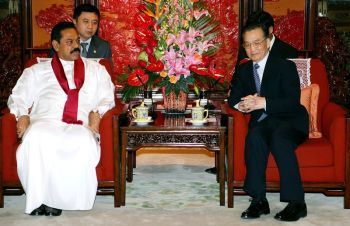
Publisher:
Bonnie King
CONTACT:
Newsroom@Salem-news.com
Advertising:
Adsales@Salem-news.com

~Truth~
~Justice~
~Peace~
TJP
Jun-06-2012 15:53

 TweetFollow @OregonNews
TweetFollow @OregonNews
The Sri-Lanka-China Relationship: A Print Media Analysis
Priyakala Manoharan Special to Salem-News.comThe policy of harmony and China’s deep pockets are vital signs of Sri Lanka shifting closer to China’s orbit.
 Courtesy: jdslanka.org |
(NEW DELHI, India IPCS) - China’s deepening relationship with Sri Lanka is becoming increasingly conspicuous as the emerging super power extends relations beyond its sphere of influence. This paper brings out the Sri Lankan perceptions of the unconditional and timely help of China for Sri Lanka’s overall development. Some of prominent Sri Lankan newspapers have been referred to gauge the general Sri Lankan outlook. The relevant questions in this context are the factors driving Sri Lanka towards China and whether China’s unlimited help to Sri Lanka is with or without strings attached.
Political relations
Sri Lanka’s contemporary relations with China have been strengthened as never before. The state owned Sunday Observer (‘China-Sri Lanka’s top lender in 2009’, 18 April 2010) has commented that “silky relationship has reached new heights during the Rajapaksha era.” Historically, Sri Lanka and China have been recorded to be on friendly terms. However, the ties have reached a peak level, especially under the administration of President Mahinda Rajapaksha. Tamil Guardian (‘India’s troubles in Sri Lanka’, 4 December 2010) shared a similar view, acknowledging that “Rajapaksha has visited China five times in office and thrice before.”
The Sri Lankan president decided to shift the foreign policy ‘eastward’ after persistent human-rights abuse allegations by the West (‘Sri Lanka looks east to China for funding and support’, The National, 11 March 2010). This has drifted Lanka closer to China. China has so far practiced a policy of not mixing business with politics in its foreign relations with Sri Lanka (‘China fuels Sri Lankan War’, LankaNewspapers.com 7 March 2009); this has given Lanka a freer atmosphere to preserve its sovereignty and autonomy and made China’s presence conducive in the Island. However, China did go out of its way to encourage the Sri Lankan government’s interest to end the protracted war, as LankaNewspapers.com reports (7 March 2009). China wanted stability on the island which served its fundamental aspirations and interests as an emerging superpower. “China stood as a support force when Sri Lanka needed help to combat terrorism” (‘Marking 55 years of Diplomatic Relations – Sri Lanka and China’, The Nation, 25 May 2012). Accordingly, sophisticated weaponry supplied by China was the key to the government’s military success.
The Defense Minister Gotabhaya in ‘China-Lanka agree to deepen military ties’ (16 September 2010, Adaderana) said that “the government and armed forces of Sri Lanka appreciated China’s support and would continue to advance friendly and cooperative relations between the two nations and the two armed forces.” “China has also used its veto power in the United Nations Security Council (UNSC) to block the discussion on steps undertaken by the Sri Lankan government in its fight against the LTTE” as reported by The National (‘Growing Chinese influence in Sri Lanka’, 8 June 2011). China defended Sri Lanka against the aggressive Western push for war crimes allegations committed by the Sri Lankan military during the final phase of the war.
Economic relations
Apart from the growing political and diplomatic relationship, Sri Lanka is able to reap the benefits of close economic cooperation with China. The Lanka Journal Newspaper (‘Sri Lanka says China’s “win-win” philosophy benefits world’, 21 November 2011) carried an article detailing that “China is the leading investor in Sri Lanka and involved in building highways, bridges, a new shipping port and airport as well as a high tech theater.” In the post war period, improvements in infrastructural development and investments from China in Sri Lanka have been seen to increase. These commercial transactions have created a win-win deal for both countries. Significantly, “Beijing has decided to grant Sri Lanka dialogue partner status in the Shanghai Cooperation Organization (SCO)” (‘Growing Chinese influence in Sri Lanka’, The National, 8 June 2011).
Counter views against China’s inroad into Sri Lanka depicted in News.LK ( ‘Minister Basil counter the criticisms of the UNP MP, 1 February 2012) express alarm that the growing Chinese work force in the Chinese projects and the flooding of Sri Lankan markets with cheap and sub-standard Chinese products were detrimental to the progress of the nation. In addition, China’s priority is on maritime security to secure energy supplies. Hence, the island has become a key strategic hub for China. On economic, military and diplomatic ties, Dr. Harsha de Silva, Member of Parliament, opined that “Sri Lanka-China relations was in bad taste and made with dangerous political twist” (News.LK, 1 February 2012).
Based on these views, the policy of harmony and China’s deep pockets are vital signs of Sri Lanka shifting closer to China’s orbit. Sri Lanka is fulsome in its praise for Beijing because it did not desert Sri Lanka in recent critical phases. Despite the end of fighting, Sri Lanka confronted a deepening economic crisis due to huge debts arising from military spending. It sought help from the West but the request was denied on the basis of its deteriorating human rights record. However, the Chinese willingly lent a helping hand in this asymmetric relationship. This even eclipsed Sri Lanka’s biggest donor, Japan, and created a scenario to counter Western concerns about human rights.

Special thanks to IPCS: Research Institutes in India
http://www.ipcs.org/article/china/the-sri-lanka-china-relationship-a-print-media-analysis-3630.html
Priyakala Manoharan
Research Intern
Email: pri_haran@yahoo.com
Priyakala Manoharan is a Resesrch Intern at the Institute of Peace and Conflict Studies (IPCS). She is reading for her Masters in South Asian Studies from Pondicherry University, Pondicherry. She has completed her graduation in Sociology from the University of Peradeniya, Sri Lanka. She is interested in South Asian Study, particularly in regional cooperation.
 |
 |
 |
 |
 |
 |
 |
Articles for June 5, 2012 | Articles for June 6, 2012 | Articles for June 7, 2012
Quick Links
DINING
Willamette UniversityGoudy Commons Cafe
Dine on the Queen
Willamette Queen Sternwheeler
MUST SEE SALEM
Oregon Capitol ToursCapitol History Gateway
Willamette River Ride
Willamette Queen Sternwheeler
Historic Home Tours:
Deepwood Museum
The Bush House
Gaiety Hollow Garden
AUCTIONS - APPRAISALS
Auction Masters & AppraisalsCONSTRUCTION SERVICES
Roofing and ContractingSheridan, Ore.
ONLINE SHOPPING
Special Occasion DressesAdvertise with Salem-News
Contact:AdSales@Salem-News.com

googlec507860f6901db00.html



Terms of Service | Privacy Policy
All comments and messages are approved by people and self promotional links or unacceptable comments are denied.
[Return to Top]
©2025 Salem-News.com. All opinions expressed in this article are those of the author and do not necessarily reflect those of Salem-News.com.